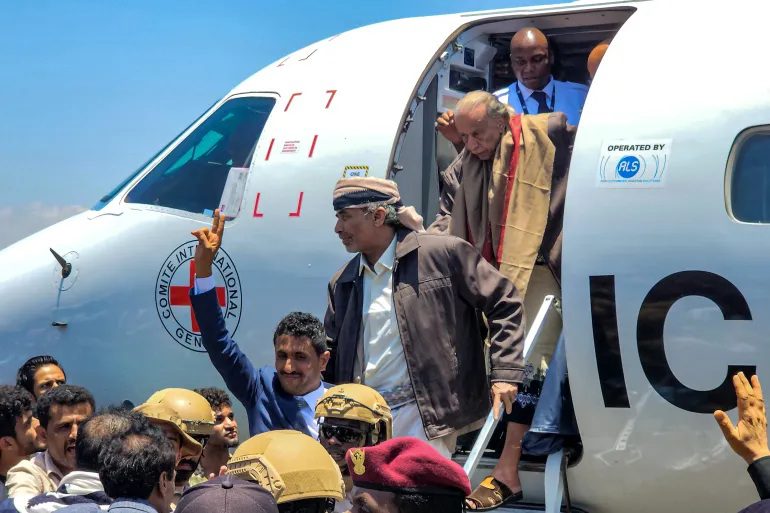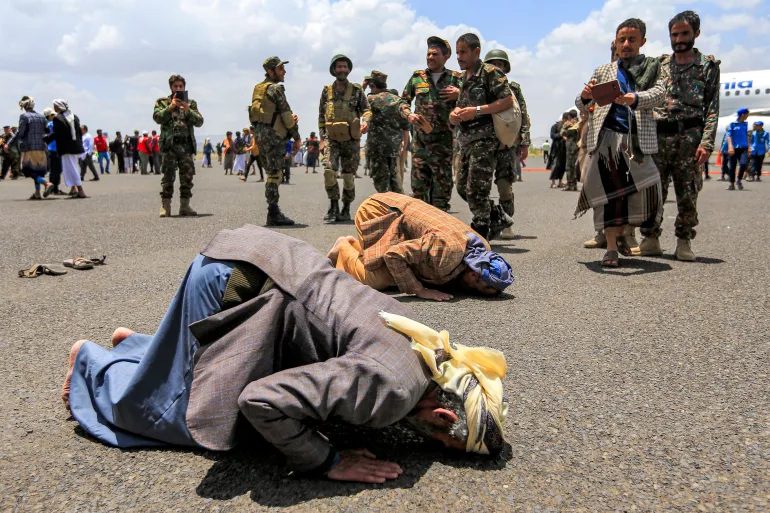Hundreds of Houthi prisoners, 16 Saudis freed on day two of swap
On April 15, 2023

Saudi Arabia and the Yemeni Houthi rebels have freed hundreds of prisoners of war as part of a multi-day exchange amid concerted efforts to end Yemen’s eight-year-old war, according to the International Committee of the Red Cross (ICRC).
Saturday’s first flight left the southern Saudi city of Abha for Yemen’s Houthi-held capital Sanaa with 120 Houthi rebel prisoners, ICRC public affairs and media adviser Jessica Moussan said.
It was followed by a flight from Sanaa to Riyadh carrying 20 former detainees, among them 16 Saudis and three Sudanese, according to the state-affiliated Al Ekhbariya channel.
Sudan is part of the Saudi-led military coalition fighting in Yemen and has provided ground troops for the conflict.
Standing on the tarmac at Sanaa International Airport, Mohammed al-Darwi, a Houthi prisoner released in the exchange, told Al Jazeera: “We are happy to return to Sanaa after we were in the prisons of the enemy.”
The Sanaa-Riyadh flight also included a brother and son of Tareq Saleh, a member of Yemen’s Presidential Leadership Council and nephew of ex-president Ali Abdullah Saleh.
Other flights on Saturday included a second Abha-Sanaa leg with 117 Houthis on board, and three more carrying a combined 100 Houthis to Sanaa from the government-held Yemeni town of Mokha.
The exchange came after 318 prisoners were transported on Friday on four flights between government-controlled Aden and the rebel-held capital, Sanaa, reuniting with their families before next week’s Muslim holiday of Eid al-Fitr.
The prisoner exchange, which involves the release of more than 800 prisoners from all sides of the conflict, is a confidence-building measure coinciding with an intense diplomatic push to end Yemen’s war, which has left hundreds of thousands dead from the fighting as well as knock-on effects, such as food shortages and lack of access to healthcare.
Path to peace?
Analysts say eight years after mobilising a coalition to crush the Houthis, the Saudis have come to terms with the fact this goal will not be met and are looking to wind down their military engagement.
Crown Prince Mohammed bin Salman, who was a 29-year-old defence minister when the war began, has since become the kingdom’s de facto ruler and is keen to focus on his sweeping “Vision 2030” domestic reform agenda.
The Saudi exit strategy appears to have taken new impetus from a landmark rapprochement deal announced with Iran last month.
“This [the prisoner swap] is the first concrete result of not only the Omani mediation but also the Iran-Saudi agreement which is beginning to bear fruit in Yemen and elsewhere in the region,” Nabeel Khoury, former US deputy chief of mission in Yemen, told Al Jazeera.
The China-brokered agreement calls for the Middle East heavyweights to fully restore diplomatic ties following a seven-year rupture and has the potential to remake regional ties.
Saudi Arabia is also pushing for the reintegration into the Arab League of Iran ally Syria, more than a decade after its suspension over President Bashar al-Assad’s brutal crackdown on pro-democracy protests.
On Friday, the kingdom, which once openly championed Assad’s removal, hosted top diplomats from eight other Arab countries in the Red Sea city of Jeddah for talks on Syria. It issued a statement highlighting the “importance of having an Arab leadership role in efforts to end the crisis”.

In Yemen, active combat has reduced over the past year following a United Nations-brokered truce that officially lapsed in October but has largely held.
A week ago, a Saudi delegation travelled to Sanaa, held by the Houthis since 2014, for talks aimed at reviving the truce and laying the groundwork for a more durable ceasefire.
The delegation, led by Ambassador Mohammed al-Jaber, left Sanaa late on Thursday without a finalised truce but with plans for more talks, according to Houthi and Yemeni government sources.
Even if Saudi Arabia manages to negotiate a way out of the war, fighting could flare up again among the different Yemeni factions.
“Saudi Arabia has been struggling to draw down its military involvement in Yemen and … seeks a long-term sustainable peace that will allow it to focus on its economic priorities,” said Sanam Vakil, director of the Middle East and North Africa Programme at Chatham House.
“Yet, despite its intention, it will be the longtime broker, investor and conflict guarantor of Yemen.”
Speaking from Washington, DC, former Yemeni detainee Hisham al-Omeisy agreed while the average Yemeni is desperate for peace, a real end to the war may be a long way still.
“A lot of people think that the end of the war will happen in a few weeks or months. I would caution against that,” he told Al Jazeera.
“It [peace] will take at least a year or two because the conflict is not just between the Houthis and the Saudis. It’s protracted and polarised with many parties and factions inside Yemen that need to be brought into an inclusive, holistic, and comprehensive [peace] process.”
This piece was republished from Aljazeera.